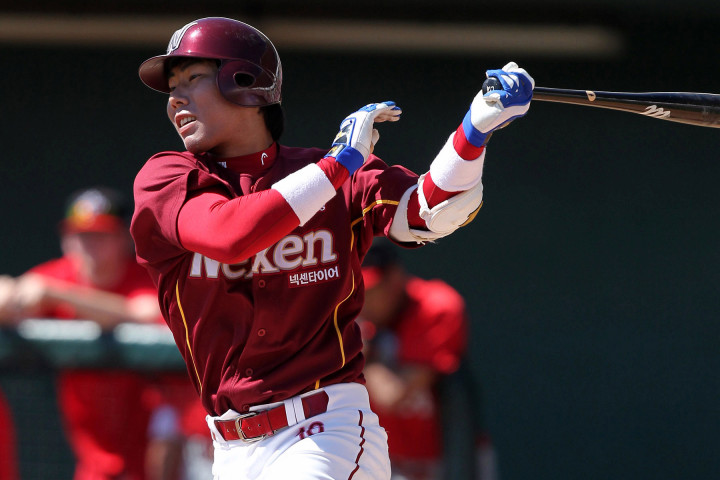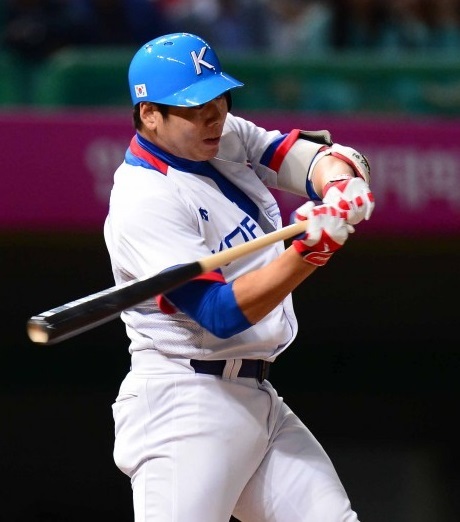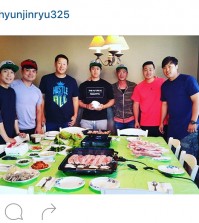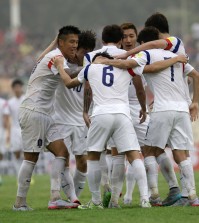- California Assembly OKs highest minimum wage in nation
- S. Korea unveils first graphic cigarette warnings
- US joins with South Korea, Japan in bid to deter North Korea
- LPGA golfer Chun In-gee finally back in action
- S. Korea won’t be top seed in final World Cup qualification round
- US men’s soccer misses 2nd straight Olympics
- US back on track in qualifying with 4-0 win over Guatemala
- High-intensity workout injuries spawn cottage industry
- CDC expands range of Zika mosquitoes into parts of Northeast
- Who knew? ‘The Walking Dead’ is helping families connect
Little room on Pirates’ roster for shortstop Kang Jung-ho without trades
SEOUL (Yonhap) — Of the 30 Major League Baseball (MLB) clubs, the Pittsburgh Pirates seemed one of the least likely teams to put in a bid when the South Korean shortstop Kang Jung-ho was posted earlier this month.
For one, their infield appeared set for next season with players still in or entering their primes in their late 20s. And the Pirates had one of the smallest payrolls in MLB in 2014, ranking 27th with US$78.1 million. Bidding millions of dollars just to have the rights to talk to an international player with no big league experience, and then potentially committing more millions of dollars to that player in a multiyear contract seemed to be the last thing the Pirates would do.
Not only did the Pirates submit a bid for Kang, they emerged on Tuesday as the surprise winner of the silent auction, with $5,002,015. The Pirates have until Jan. 20 to try to reach an agreement with the 27-year-old slugger from the Korea Baseball Organization (KBO) who batted .356 with 40 home runs, 117 RBIs and a 1.198 on-base plus slugging percentage (OPS) this year for the Nexen Heroes.
There is obviously no guarantee that Kang, represented by veteran agent Alan Nero, will sign with the Pirates. And given the Bucs’ current roster, there is also no guarantee that Kang will have a spot in the everyday lineup for manager Clint Hurdle even if he joins the team with proven infielders.
Neil Walker, a Pittsburgh native, has been their regular second baseman since 2010 and has been putting up some solid offensive numbers. In 2014, he had 23 home runs and 76 RBIs, ranking second on the team in both categories behind center fielder Andrew McCutchen.
In his third big league season, shortstop Jordy Mercer established career-highs with 12 home runs and 55 RBIs, while also improving his defense.
The Pirates recently acquired Sean Rodriguez, who can play second, third, short and the outfield, as a potential backup to Mercer.
Elsewhere in the infield, third baseman Pedro Alvarez will move to first base after Ike Davis was dealt to the Oakland Athletics. Neal Huntington, the team’s general manager, has said utility man Josh Harrison will be the Pirates’ everyday third baseman in 2015. The versatile 27-year-old played in five different positions in 2014. Given Harrison’s offensive production — a .315 average, 13 home runs and 18 steals in 143 games this year — and strong defense, he appears to be a lock at the hot corner.
The Pirates’ depth chart seems to suggest Kang has no place in their infield, which begs the question: just where and how often will he play if he signs with the Pirates? Did they bid $5 million just so he could provide some depth on the bench?
After the Pirates won the bid for Kang, Mercer promptly emerged as a possible trade target. Though the 28-year-old set career-highs in power numbers, his batting average dipped 30 points from 2013 to .255. His on-base percentage went down from .336 to .305 and his slugging percentage fell from .435 to .387.
Mercer isn’t eligible for arbitration for another season and the Pirates may not deal him right away. Ironically, the New York Mets and the Oakland A’s, the two clubs initially thought to be interested in Kang as their new shortstop, could pursue Mercer if he becomes available in the market.
Kang, listed at 183 centimeters and 96 kilograms (6 feet and 212 pounds), may never win a Gold Glove in the majors and scouts have had reservations about his limited range and agility at short. He tends to wait for grounders rather than charging at them, something that has worked on artificial turf at the Heroes’ home, Mokdong Stadium, where his strong arm could still get outs.
The same approach will not fly at PNC Park, the Bucs’ home, and other stadiums with natural grass, but the Pirates will have some flexibility to move Kang to third thanks to his throwing abilities.
In high school, Kang was a catcher who occasionally pitched. He played behind the plate early in his KBO career but has been primarily a shortstop. Kang was South Korea’s third baseman when the country won the 2010 Asian Games gold medal.
Walker has been one of the National League’s most productive second basemen offensively, but advanced metrics suggest his defense has slipped over the years. He has had some back problems, and Kang, whether he likes to play second base or not, could be an option there for the Pirates.
In another potential scenario, Harrison can play right field if Gregory Polanco, one of the Pirates’ prized prospects at 23, doesn’t pan out and make improvements as expected, which would open up third base for Kang.
Pittsburgh media also suggested that the Pirates could trade Walker, who will cost the team nearly $20 million in his final two years of arbitration, or that they could ship Alvarez and move Walker to first base, allowing Kang to take over second base.
After the Heroes accepted the bid last weekend — before learning who’d put in the money — Kang said he would like to begin his big league career as a shortstop. If he had to change positions, Kang said he’d prefer third base to second base because he was more familiar with the hot corner.
Kang also said his goal is to hit around .260 to .270 with 15 or so home runs in his first big league season.
No matter which position he may hold down on the Pirates, Kang, should he sign a contract, will be joining a franchise that has made the playoffs over the past two seasons after enduring 20 consecutive losing seasons.
Aside from the perennial MVP candidate McCutchen — he finished in the top three in NL MVP voting in each of the past three seasons and won it in 2013 — the Pirates are without a household name superstar. Yet they more than made up for their lack of star power with one of the most productive offenses in 2014.
McCutchen led the club with 25 home runs, not an overwhelming number by any means, but eight of his teammates reached double figures in the long ball department. Together, they hit 156 home runs to rank sixth among 30 MLB clubs.
The Pirates were also fifth in batting average, third in on-base percentage and seventh in slugging percentage.

















